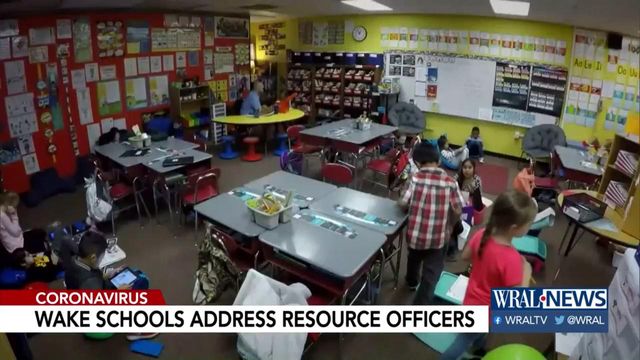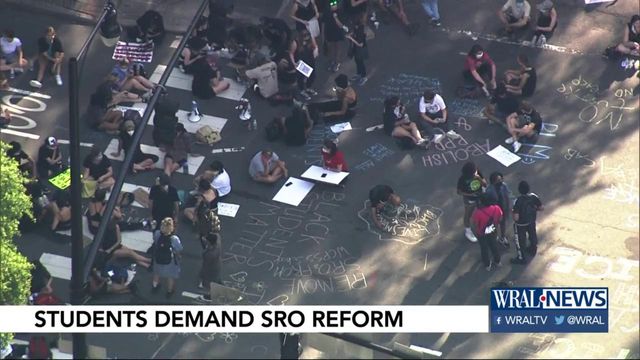Parents have until June 1 to comment on use of law enforcement officers in Wake schools
The latest agreement clarifies when law enforcement can intervene in cases of student misconduct and outlines increased communication with law enforcement and the community. It stops short of banning officer use of force against students, for which many opponents of the program have been asking.
Posted — UpdatedThe district revealed its draft agreement May 18 and will take public comments until June 1.
The current agreement with law enforcement agencies expires June 30, and schools will need to sign new agreements soon to have officers in place for the upcoming school year.
The latest agreement clarifies when law enforcement can intervene in cases of student misconduct and outlines increased communication with law enforcement and the community. It stops short of banning officer use of force against students, for which many opponents of the program have been asking.
It’s the latest iteration of the agreement after the Wake County Board of Education agreed to review the school resource officer program after community complaints concerning use of force and racial bias in court referrals by those resource officers. Still, many community members have wanted to dismantle the program entirely.
The Wake County school district has 75 school resource officers, which are provided by 11 law enforcement agencies. Every high school has a school resource officer — 34 work in high schools. Another 37 work in middle schools and four work in elementary schools.
The program costs nearly $12.5 million annually, with most of that paid by the municipalities in which the schools are located. The municipalities contribute about $11.3 million, and the school district contributes $1.1 million, with most of that coming from state discretionary funds.
Changes to the agreement
The draft agreement spells out five levels of student misconduct, followed by an explanation of which ones may necessitate school resource officer intervention.
Level 1 misconduct — such as inappropriate language, noncompliance, using cell phones when prohibited — shouldn’t require intervention. Level 2 misconduct — such as disruptive behavior, property damage, indecent expire or threats — may intermittently require intervention, the draft states.
But the majority of law enforcement intervention would fall under the next three levels, which include drug possession, firearm possession or anything that would lead to permanent expulsion.
The draft asks law enforcement agencies to agree that the majority of student misconduct likely will not require school resource officer intervention and can be handled by other school officials.
“As discussed further below, the parties agree that law enforcement and SRO intervention should be limited to those incidents of student misconduct that present a threat to the school environment and are not more appropriately handled through referral to another resource (e.g., an administrator, school counselor, restorative justice-trained staff member),” the draft states.
Intervention that does take place should be “reasonable in scope and duration” based on the circumstances and should “protect the physical safety of members within the school community, while minimizing, to the extent possible, any unintended negative effects on students.” Intervention “must not be excessive, arbitrary, or malicious.”
The law enforcement agency’s procedures and protocols pertaining to use of force should be consistent with the specific revisions recommended by Governor Roy Cooper’s Task Force on Racial Equity in Law Enforcement, the draft states.
School resources should also regularly meet with school principals and participate in creating school safety plans.
Feedback so far
People have already provided feedback as a part of the public comment portion of Wake County Board of Education meetings. For months, dozens and dozens of comments have come in on the topic of school resource officers. Many are concerned with police use of force against students and disproportionate referral of students of color to juvenile courts. They want to see use of force banned in schools and a committee to independently field and review complaints against school resource officers.
In the last year, a group of students, the Wake County Black Student Coalition, has organized against the officers and promoted replacing them with the PeaceBuilders program, a professional development program for educators that works to prevent violence and improve the school environment.
The Coalition has held demonstrations in the past year, campaigning for “Counselors, Not Cops.”
The school district has conducted two informal surveys in the last year that have generally shown favor for having school resource officers, with some suggestions of improvement.
Wake County Board of Education members have echoed some of those concerns, which have been reflected in the draft under review now.
Looking forward
With the current memorandum of understanding with law enforcement agencies expiring at the end of June, district officials want to finalize an agreement to put before law enforcement well before then. District officials have had discussions with law enforcement agencies about the program, and those agencies can choose whether to sign on.
While the draft was first released publicly May 18, the Wake County Board of Education continued to discuss changes to the program as recently as Wednesday, during the board’s Safety and Security Committee meeting.
The district is exploring incorporating roundtable discussions between school resource officers and school administrators in its training as a part of the proposed agreement. That could help “foster good working relationships and help both parties gain greater understanding of their respective roles,” according to the presentation.
The district is also exploring collaborative discussions that would take place between school resource officers and students. Student representatives from schools with resource officers would allow the students to voice their perspectives, concerns and experiences with officers and school administrators.
A new restorative justice showcase would help show officers and administrators best practices and how to implement them, Office of Security officials said Wednesday during their presentation.
Currently, Wake County schools offers two different training sessions, one half-day session in August for school resource officers and their administrators and another half-day guidance session designed for just law enforcement after the winter break.
The August session has covered different topics over the years, including legal guidance, behavioral health and equity.
The January guidance session has covered equitable discipline, bridging generational gaps and “Understanding the Latino Culture,” according to the presentation.
Related Topics
• Credits
Copyright 2024 by Capitol Broadcasting Company. All rights reserved. This material may not be published, broadcast, rewritten or redistributed.






